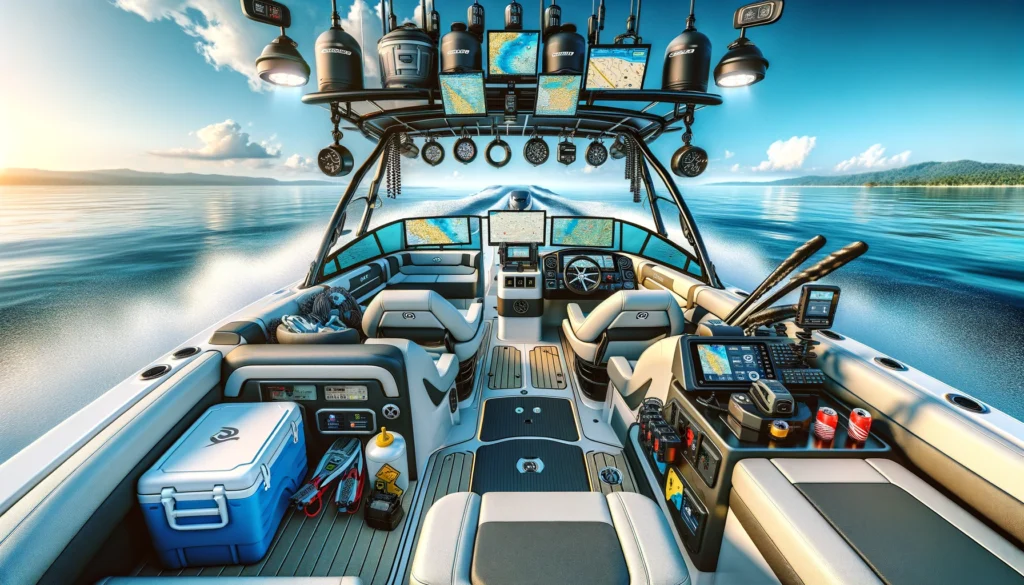Imagine the gentle lap of waves against the hull, the thrill of the open water, and the promise of unforgettable adventures—welcome to the world of boating. For many, the call of the sea (or lake) is irresistible, offering a unique blend of freedom, tranquility, and excitement that only boating can provide. Yet, venturing into this world can seem daunting for beginners, with so many aspects to consider from choosing the right vessel to mastering navigational skills. But fear not, the journey from novice to confident boater is an exhilarating one, and it starts with arming yourself with the right information.
Embarking on your boating journey is not just about acquiring a vessel; it’s about embracing a lifestyle that respects the water, prioritizes safety, and cherishes the joy of exploration. Whether you’re drawn to the serenity of a solo sail, the camaraderie of cruising with friends, or the thrill of water sports, the key to a memorable boating experience lies in preparation and knowledge.
This guide is your first mate in this adventure, offering essential boating tips, safe boating practices, and practical advice for starting with boating. Designed specifically with beginners in mind, our goal is to navigate you through the basics of boating, ensuring your experiences on the water are not just safe but truly unforgettable.
As we delve into the secrets to a perfect boating experience, we’ll cover everything from mastering the boating basics to enhancing your on-water experiences. So, whether you’re gearing up for your first voyage or looking to deepen your nautical knowledge, our beginner’s guide to boating is your compass to navigating the waters ahead. Let’s set sail into a world where adventure awaits at every turn, guided by the stars of safety, learning, and an undying love for the water.
Contents
- 1 Understanding the Basics of Boating
- 2 Preparing for Your Boating Journey
- 3 Essential Boating Tips for Navigation and Operation
- 4 Safety First: Boating Safety Essentials
- 5 Essential Boating Tips
- 6 Boating Experience Tips for Beginners
- 7 Starting with Boating
- 8 Final Thoughts: Boating Experience Tips for Beginners
- 9 Resources
Understanding the Basics of Boating

Before you can truly enjoy the freedom of the open water, it’s crucial to get acquainted with the basics of boating. This foundation not only ensures your safety and that of others on the water but also enhances your overall boating experience. Let’s dive into the fundamentals that every aspiring boater should know.
Types of Boats and Their Purposes
Boating is a broad term that encompasses a wide range of watercraft, each designed for specific activities and preferences. From the graceful sailboats that harness the wind, to the powerful motorboats that provide speed and agility, the choice of vessel significantly influences your boating experience. Yachts offer luxury and comfort for longer voyages, while kayaks and canoes provide a more intimate connection with the water, ideal for exploration and fitness. Understanding these differences is the first step in choosing the right boat for your adventures.
Basic Terminology and Parts of a Boat
Familiarizing yourself with boating terminology and the basic parts of a boat is like learning a new language—it’s essential for communication and safety on the water. Terms such as “bow” (the front of the boat), “stern” (the back), “port” (left side when facing the bow), and “starboard” (right side when facing the bow), are fundamental. Knowing the function and location of the helm (where the boat is steered from), the keel (the boat’s backbone), and the rudder (used for steering) will also enhance your understanding and control of your vessel.
Choosing the Right Boat
Selecting the right boat is a pivotal decision that should align with your intended activities, budget, and skill level. Consider the environments you’ll be exploring (lakes, rivers, coastal waters), the size of the crew (solo, family, or groups), and the activities you’re interested in (fishing, watersports, cruising). Researching and seeking advice from experienced boaters can provide invaluable insights into making the best choice for your needs.
Importance of a Beginner Boating Guide
A comprehensive beginner boating guide is an indispensable tool for anyone starting their boating journey. It offers step-by-step instructions on everything from launching your boat to navigating and docking, along with tips for maintenance and safety. Such a guide not only boosts your confidence but also ensures that your boating experiences are both enjoyable and secure.
By mastering these boating basics, you lay the groundwork for a lifetime of adventures on the water. Remember, every expert boater was once a beginner, and with patience, practice, and a passion for learning, you too can navigate the waters with ease and enjoyment. As we move forward, we’ll delve deeper into how to prepare for your boating journey, ensuring you’re well-equipped for whatever lies ahead.
Preparing for Your Boating Journey
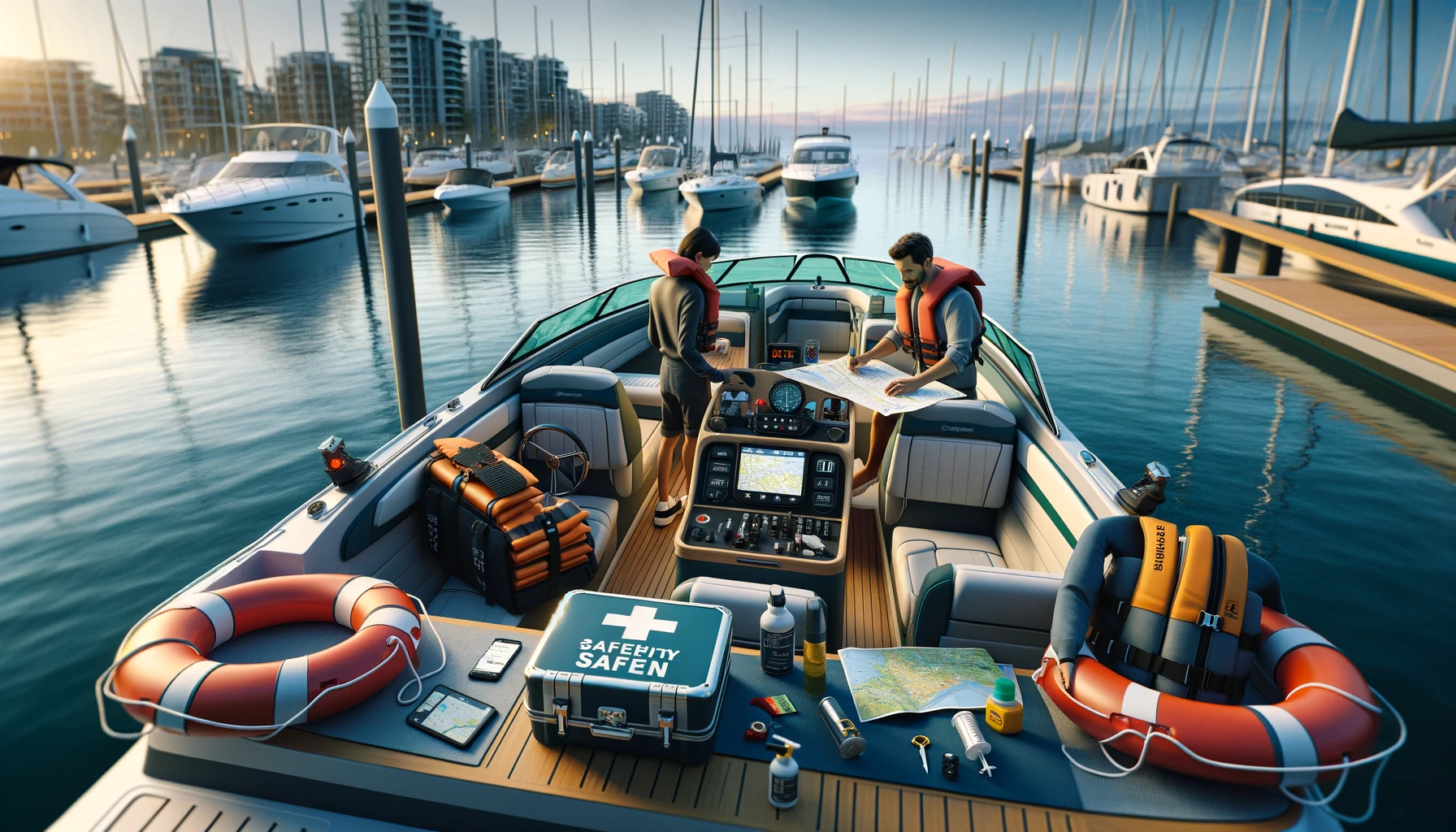
Embarking on your first boating adventure is an exciting prospect, filled with anticipation and the promise of new experiences. Proper preparation is key to ensuring your journey is not only enjoyable but also safe. This section outlines essential steps and considerations to help you start your boating journey on the right foot.
Essential Gear and Supplies for Your First Trip
Safety and comfort on the water are paramount. Equip your boat with all necessary safety gear, including life jackets for all passengers, a first aid kit, fire extinguishers, and distress signals. Additionally, pack sufficient water, sun protection, and clothing adjustments for weather changes. Navigation tools, such as maps, compasses, and if available, GPS devices, will keep you on course. Remember, over-preparation is better than being caught off guard.
Understanding Weather Conditions and Planning Your Itinerary
Weather can greatly influence the safety and enjoyment of your boating trip. Before setting out, check the weather forecast and understand how conditions like wind, rain, and storms could affect your journey. Learn to read weather signs and plan your itinerary accordingly, always having a contingency plan in case of sudden weather changes. Familiarize yourself with the waterways you’ll be exploring to ensure you’re aware of any navigation challenges or restrictions.
The Importance of a Float Plan
A float plan is a safety document you leave with a friend or family member detailing your boating trip’s specifics, including departure and return times, route, and contact information. In the event of an emergency, this plan can be invaluable in directing search and rescue efforts. Always inform someone of your plans before departing.
Beginner’s Guide to Boating Courses and Certifications
Investing time in boating courses and obtaining necessary certifications is not just about compliance with local regulations—it’s about confidence and competence on the water. Many organizations offer courses covering boating safety, navigation, and handling. These courses can provide you with the knowledge and skills to ensure your boating experiences are safe and enjoyable.
As you prepare for your boating journey, remember that every trip is a learning opportunity. With the right boat, gear, and knowledge, you’re well on your way to creating memorable experiences on the water. Stay tuned for our next section, where we’ll dive into essential tips for navigation and operation, further enhancing your boating skills and readiness for adventure.
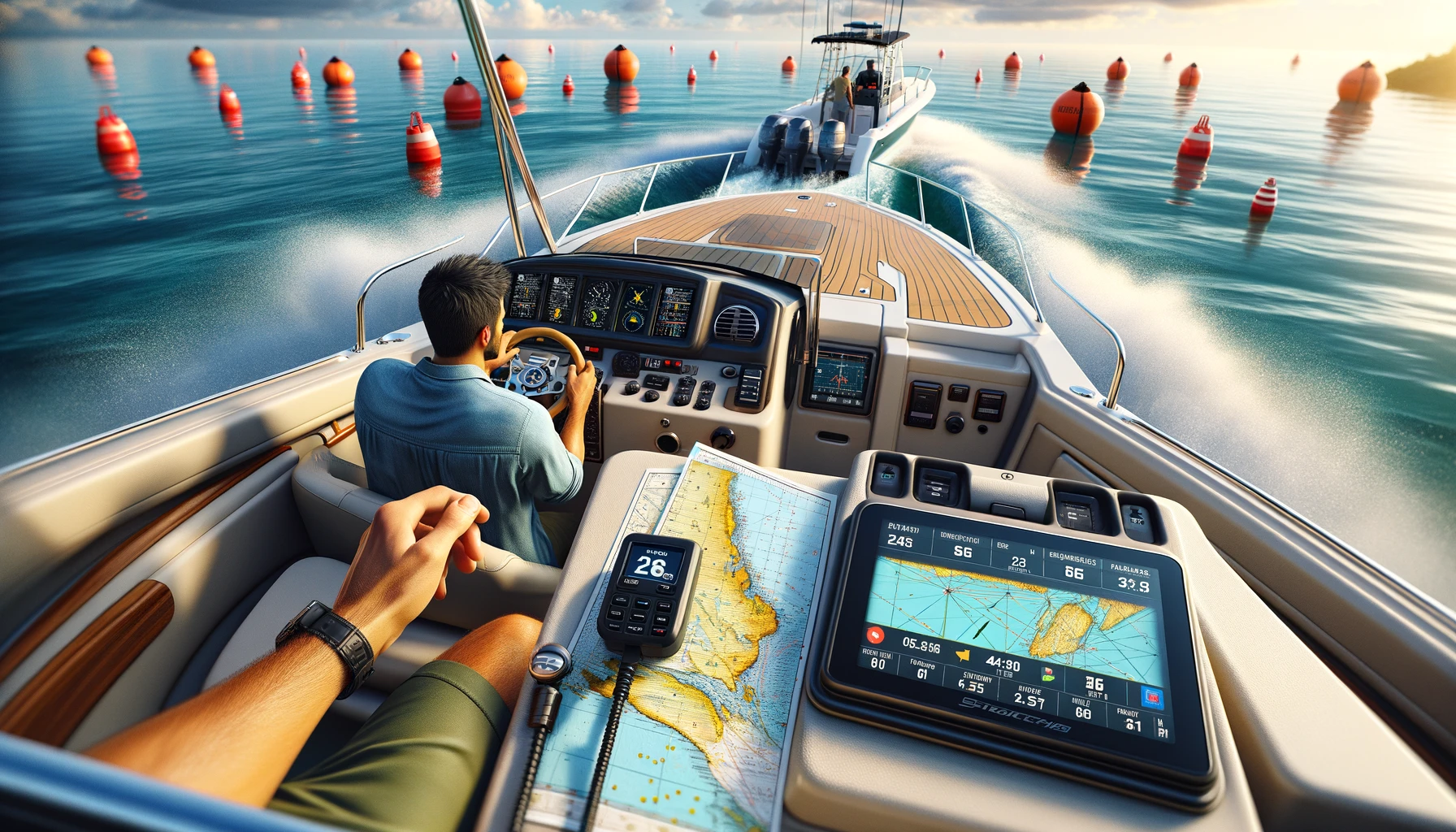
Navigating the waters safely and confidently is the cornerstone of a rewarding boating experience. This section dives into essential tips for navigation and operation, designed to guide beginners through their initial voyages with ease. By mastering these fundamentals, you’ll enhance not only your safety but also the enjoyment of your boating adventures.
Understanding the basics of navigation is crucial before you set sail. Start with learning how to read nautical charts, which provide detailed information about water depths, hazards, and landmarks. Familiarize yourself with buoy markers and navigation aids, such as lighthouses, which guide safe passage and indicate dangerous areas. Practicing the use of a compass alongside your charts will help you navigate more effectively, even in low visibility conditions.
In today’s digital age, technology plays a significant role in navigation. GPS devices and marine navigation apps can greatly enhance your ability to chart courses and monitor your position. However, it’s important to not rely solely on electronic devices. Batteries can fail, and signals can be lost. Always have a physical map and compass as backups and ensure you know how to use them.
Operating Your Boat Safely
Operating a boat safely requires knowledge of basic maneuvers and an understanding of boating etiquette. Learn how to start your boat, steer, throttle, and anchor correctly. Practice docking in various conditions, as this is often one of the more challenging skills for beginners. Always be aware of your surroundings, including other boats, swimmers, and potential hazards. Speed should be adjusted according to the boating environment, weather conditions, and local regulations.
Communication on the Water
Effective communication is vital for safety on the water. Understand and use standard maritime signals and phrases to communicate with other boaters. A marine radio is an essential tool for receiving weather updates, communicating with marinas, and calling for assistance in emergencies. Ensure you know how to operate your marine radio and are familiar with the procedures for sending distress signals.
Right of Way and Boating Etiquette
Familiarize yourself with the “rules of the road” for waterways, including who has the right of way in different situations. These rules help prevent collisions and ensure smooth navigation. Boating etiquette extends beyond right of way; it encompasses respecting noise levels, maintaining a safe distance from other vessels, and protecting the marine environment.
By adhering to these essential navigation and operation tips, you’re setting the stage for successful and enjoyable boating experiences. Remember, competence comes with practice, and every trip is an opportunity to improve your skills. Stay tuned for our next section, where we’ll explore the crucial aspects of boating safety, ensuring you’re well-prepared for any situation on the water.
Safety First: Boating Safety Essentials
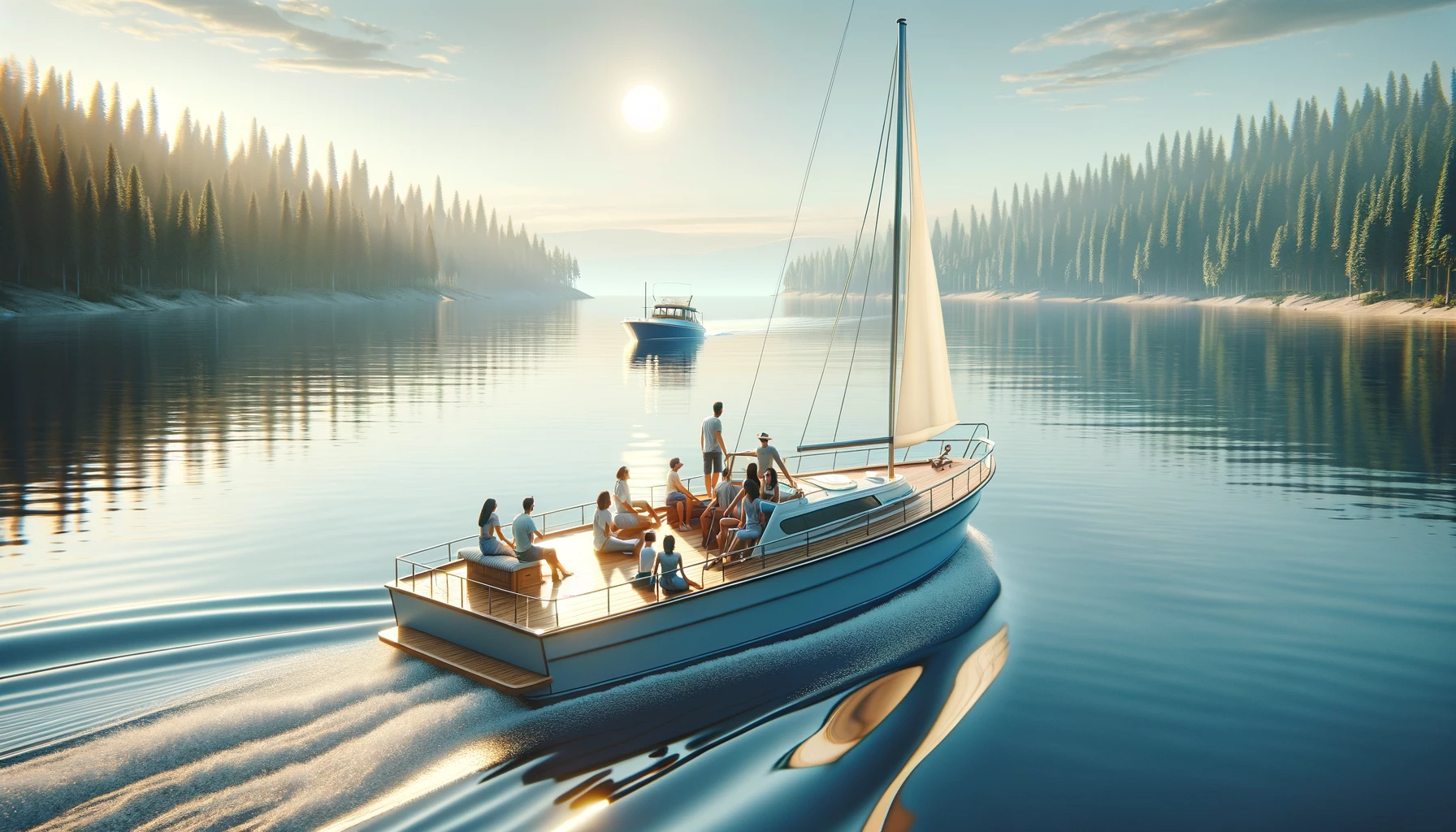
Safety is paramount in all boating activities. Ensuring you and your passengers remain safe on the water involves preparation, knowledge, and adherence to boating safety practices. This section highlights the critical safety essentials that every boater should prioritize to ensure a secure and enjoyable experience on the water.
Importance of Life Jackets
One of the simplest yet most effective safety measures is the use of life jackets. A life jacket should be worn at all times by everyone on board, regardless of swimming abilities. Modern life jackets are designed for comfort and mobility, so there’s no excuse to skip wearing one. Ensure your life jackets are U.S. Coast Guard approved and properly fit each passenger.
Right Safety Equipment On Board
Your boat should be equipped with essential safety equipment, including:
- Fire extinguishers: Appropriate for the size and type of your vessel.
- First aid kit: Stocked with supplies to handle minor injuries or illnesses.
- Distress signals: Both visual (flares, signal mirror) and audible (horn, whistle) to use in case of emergency.
- Communication devices: A waterproof, fully charged marine radio or a cellphone in a waterproof case for emergency calls.
Understanding Boating Laws and Regulations
Familiarize yourself with local boating laws and regulations, which can vary significantly from one area to another. This includes speed limits, age requirements for operating a boat, and specific rules about operating under the influence of alcohol or drugs. Compliance with these laws not only keeps you and others safe but also ensures a hassle-free boating experience.
Dealing with Emergencies
Prepare for potential emergencies by:
- Knowing how to call for help: Understand how to use your marine radio or other communication devices to contact emergency services.
- Man overboard procedures: Familiarize yourself and your crew with the steps to take if someone falls overboard, including how to stop the boat quickly and safely retrieve the person.
- Evacuation plan: Have a clear plan for evacuating the boat in case of fire or sinking, including the location of life rafts and emergency exits.
Continuous Learning and Practice
Safe boating is a continuous learning process. Consider taking advanced boating safety courses and participating in hands-on safety drills. The more prepared you are, the more confidently you can handle unexpected situations.
Safety on the water is everyone’s responsibility. By prioritizing these boating safety essentials, you ensure not only your well-being but also that of your passengers and fellow boaters. Remember, a safe boating experience is a more enjoyable one for everyone involved.
Essential Boating Tips
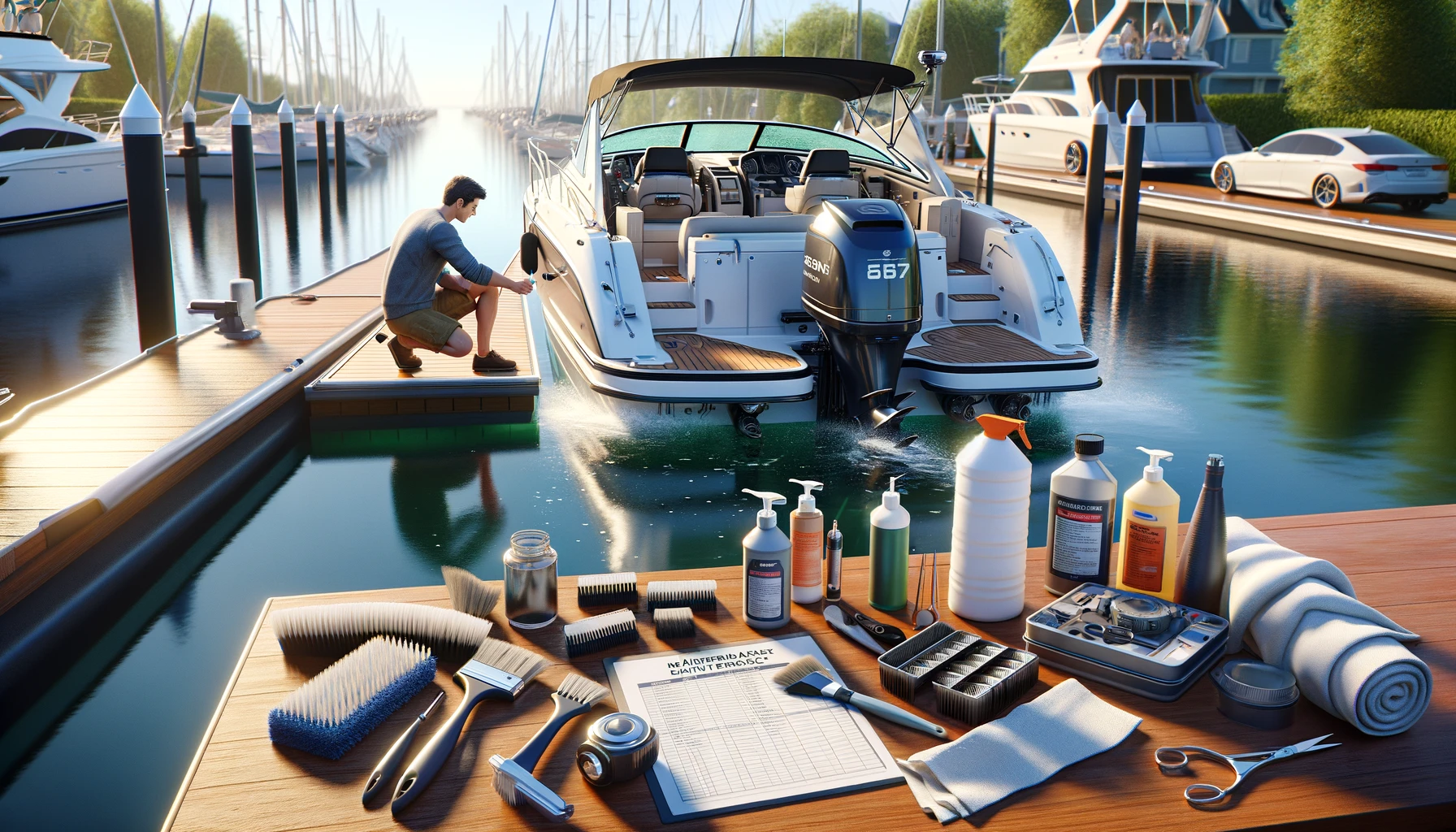
For a boat to provide years of enjoyment, regular maintenance and upkeep are critical. This section delves into the essential practices that keep your boat in top condition, ensuring safety, reliability, and longevity. Whether you’re a seasoned sailor or a newcomer to the waters, these tips will help you maintain your vessel effectively.
Routine Maintenance Tasks
Regular maintenance tasks are the cornerstone of boat upkeep. This includes checking the engine, batteries, and fuel system for any signs of wear or damage. Ensure that the hull is clean and free of any fouling, which can affect your boat’s performance and fuel efficiency. Inspecting the propeller for damage and ensuring that the bilge pump is operational are also crucial steps.
Winterizing Your Boat
If you live in a region where boating is seasonal, winterizing your boat is essential to protect it from the cold and inactivity. This process involves draining any water from the engine, applying antifreeze to the plumbing systems, removing and storing sensitive electronics, and covering the boat to protect it from the elements. Proper winterization can prevent costly repairs and extend the life of your boat.
Importance of Regular Inspections and Servicing
Scheduling regular inspections and servicing with a professional can help identify potential issues before they become major problems. These check-ups should include the boat’s electrical systems, engine, and hull integrity. Professionals can also provide valuable advice on any upgrades or modifications that can enhance your boating experience.
DIY vs. Professional Maintenance
While many boaters take pride in performing their maintenance, knowing when to seek professional help is important. Complex tasks, such as engine overhauls or electrical work, should typically be left to the experts. However, many maintenance tasks, like cleaning, minor repairs, and equipment checks, can be handled by the boat owner, fostering a deeper connection with their vessel.
Keeping a Maintenance Log
A detailed maintenance log can be invaluable, tracking repairs, servicing, and any changes or upgrades made to your boat. This record not only helps you stay on top of maintenance tasks but also proves beneficial for warranty purposes and can increase your boat’s resale value.
Maintaining your boat is a continuous commitment that pays dividends in the form of reliable performance and lasting enjoyment. By adhering to a regular maintenance schedule, you ensure that your boating adventures remain safe and enjoyable, year after year.
Boating Experience Tips for Beginners

Once you’re comfortable with the basics of boating and have established a routine for maintenance, the next step is to enhance your boating experience. This involves not just where you go or what you do, but also how you engage with the boating community and continue to grow your skills. Here are some tips to enrich your journey on the water.
Joining a Boating Community or Club
Connecting with a boating community or club can significantly enhance your boating experience. These groups offer a wealth of knowledge and are a great resource for learning new skills, discovering new destinations, and making friends with similar interests. Many clubs also organize events and outings, providing opportunities to explore in a safe and supportive environment.
Learning from Experienced Boaters
There’s no substitute for experience, and seasoned boaters often have insights and tips that you won’t find in any guidebook. Engaging with experienced boaters can help you navigate the learning curve more smoothly. Don’t hesitate to ask for advice on everything from navigation to boat maintenance. Most boaters are happy to share their knowledge and stories.
Taking Boating Courses
While you may have completed a basic boating course to start your journey, there’s always more to learn. Advanced navigation, weather forecasting, engine maintenance, and safety courses can all enhance your skills and confidence on the water. Many courses are available online, making it easy to continue your education at your own pace.
Exploring New Waters
One of the joys of boating is the endless opportunity for exploration. Whether it’s visiting new marinas, cruising along different coastlines, or navigating the vastness of open waters, each trip can offer new sights and challenges. Keep a boater’s log of your adventures, noting what you’ve learned and places you’d like to visit again.
Making Boating a Family or Social Activity
Boating can be a wonderful way to spend quality time with family and friends. Teaching your loved ones about boating not only helps them appreciate the beauty of the waterways but also instills a sense of responsibility and teamwork. Planning group outings or participating in community boating events can create lasting memories and traditions.
Starting with Boating

Embarking on your boating journey doesn’t necessarily require owning a boat. Boat rentals offer a flexible and cost-effective way to explore the waters without the commitment and expenses of ownership. This section provides insights into starting with boat rentals, ensuring a smooth and enjoyable experience for beginners.
Advantages of Renting Before Buying
Renting a boat comes with several benefits, especially for those new to boating. It allows you to:
- Test Different Boat Types: Experience various boat models and types to find what best suits your preferences and boating needs.
- Learn Without the Long-Term Commitment: Develop your boating skills and knowledge without the ongoing maintenance, storage, and insurance costs associated with ownership.
- Explore Different Waterways: Rentals can offer the opportunity to boat in various locations, providing diverse experiences with each outing.
Tips for Choosing a Rental Service
When selecting a boat rental service, consider the following:
- Reputation: Look for services with positive reviews and recommendations.
- Selection and Condition of Boats: Ensure they offer a variety of well-maintained boats.
- Pricing and Policies: Understand the rental costs, deposit requirements, and cancellation policies.
- Safety and Instruction: Choose services that provide thorough safety briefings and operational instructions for their boats.
Preparing for a Rental Boating Experience
To make the most of your rental:
- Plan Your Trip: Research and decide on your boating route, taking note of weather conditions and waterway regulations.
- Check Required Qualifications: Some areas or rental services may require a boating license or safety course completion.
- Pack Appropriately: Bring along necessary supplies such as water, snacks, sunscreen, and appropriate clothing for weather changes.
What to Expect on the Day
On the day of your rental, arrive early to complete any paperwork and participate in a comprehensive walkthrough of the boat. This is the time to ask questions about the boat’s operation, safety equipment, and emergency procedures. Ensure you’re comfortable with the controls and any navigation equipment before setting out.
Renting a boat can be a fantastic way to enjoy boating adventures without the commitment of ownership. It offers a chance to learn, explore, and spend time on the water with friends and family. By choosing the right rental service and preparing adequately for your trip, you can ensure a safe and memorable boating experience.
As we draw to a close on our guide, “Secrets to a Perfect Boating Experience: Essential Tips for Beginners,” it’s clear that the journey into boating is as vast and rewarding as the waters themselves. From mastering the basics of boating, ensuring safety and preparedness, to maintaining and enhancing your vessel, each step brings its own set of joys and challenges. But beyond the practical advice and tips shared, the heart of a truly remarkable boating experience lies in the passion and respect we bring to the water.
Final Thoughts: Boating Experience Tips for Beginners

Boating is more than a hobby or a pastime; it’s a lifestyle that opens up new horizons and fosters a deep connection with nature. Whether it’s the tranquility of a solo sail at dawn, the joy of a family excursion, or the thrill of exploring uncharted waters, boating offers endless opportunities for adventure and discovery.
Continuous Learning and Growth
The path to becoming a seasoned boater is paved with continuous learning and growth. The water teaches us to be adaptable, patient, and respectful of its power. Embrace every opportunity to learn, whether through courses, from fellow boaters, or through your own experiences. With each voyage, you’ll gain not just skill and knowledge, but also confidence and a deeper appreciation for the boating world.
The Importance of Community
The boating community is a tapestry of individuals who share a love for the water. By joining this community, you gain access to a wealth of knowledge, support, and camaraderie. Remember, boating is not just about the journey or the destination; it’s about the people you meet and the memories you create along the way.
Bon Voyage
As you embark on or continue your boating journey, keep these tips and insights in mind. Respect the water, prioritize safety, maintain your vessel, and seek out new experiences. But most importantly, enjoy every moment. The water is a place of freedom, adventure, and serenity—a sanctuary where you can connect with nature, with others, and with yourself.
Boating opens a world of possibilities. May your journeys be safe, your adventures grand, and your love for the water everlasting. Here’s to smooth sailing and the countless joys that boating brings into our lives.
Resources
For adventure boating enthusiasts looking to enhance their experience on the water, a wealth of resources is available to guide you through everything from safety to discovering new destinations. Here are some of the best resources to consider:
Boating Safety and Education
- National Safe Boating Council (NSBC): Offers tips for all boaters to brush up on safety skills and prepare for the boating season. They emphasize the importance of wearing life jackets and recommend taking a boating safety course. Their website is a hub for boating safety resources, including free vessel safety checks and making a float plan.
Adventure Boating Destinations
- Discover Boating: Provides a list of 10 best destinations for boating, camping, and hiking adventures, such as First Landing State Park in Virginia, Dry Tortugas National Park in Florida, and Lake Tahoe straddling Nevada and California. Each location offers unique opportunities for exploration and enjoying nature
- Florida Keys Boating Map & Cruising Guide: Offers insights into various locations within the Florida Keys that are ideal for adventure boating, including Tavernier, Islamorada, and Sugarloaf Key. These spots are perfect for those looking to combine boating with activities like fishing, snorkeling, and exploring natural beauty
Boating Guides & Resources
- BoatingWorld: Features articles on various boating topics such as maintenance tips, sea safety, navigating rough seas, and selecting the perfect bottom paint for your boat. It’s a comprehensive resource for boaters looking to deepen their knowledge and skills
- Boatsetter: Offers boat rental options across various locations, making it easier for adventure seekers to explore new waters without the commitment of owning a boat. Locations include Lake Powell, Lake Tahoe, and the Florida Keys, among others
Boating Education & Licensing
- Take Me Fishing: Provides a comprehensive guide to getting started with boating, including how to register your boat, obtain a fishing license, and learn the basics of boating. It’s an essential resource for beginners and those looking to refine their skills



